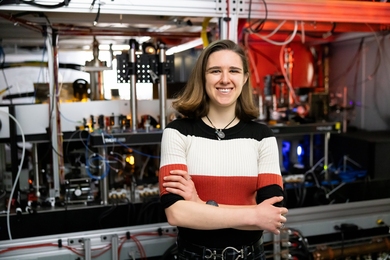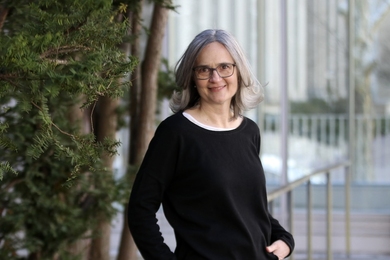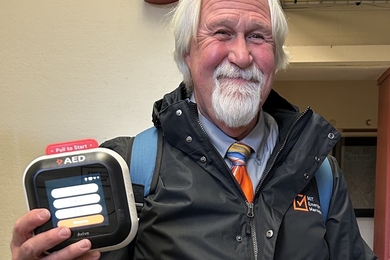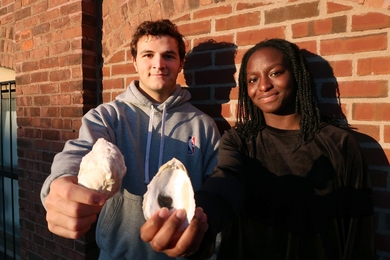Pianist Eleanor Perrone has taught piano to MIT students for 11 years in conjunction with music theory courses, offering training to advanced musicians and beginners alike. Ms. Perrone, whose playing has been praised by the Boston Globe for its "clarity, definition and energy to spare," performs her last affiliated-artist concert next week as she completes her final semester as affiliated artist at MIT. Trained at the Juilliard School and Boston University, Ms. Perrone also teaches at the Walnut Hill School and the Brookline Music School. Lynn Heinemann of the Office of the Arts asked her about her life as a pianist and her experiences at MIT.
How did you decide to be a pianist?
I first went to the piano at the age of four. I had perfect pitch, so I would pick out tunes and try to copy my brothers, who were taking lessons. It really annoyed them. When I was six, the piano teacher heard me massacring a set of Beethoven variations and insisted I take lessons. I went to it naturally and always knew this was what I was going to do. I suppose I rebelled against that for a while because you want to feel that you have some say in what you're going to do with your life. I think it's important to rebel and then decide for yourself that this is really what you love and what you want to spend your life doing.
How did you come to MIT?
In 1984 I won a competition at BU and part of that prize was that I got to perform in the music library at MIT -- this was before there was a Killian Hall. It was very strange -- I remember the phone ringing in the middle of the recital. This was when I discovered there was such a thing as music at MIT. I'd certainly never even thought that anyone even listened to music at MIT. My whole image, at that point, was of computer people, science and math.
What do you like about teaching at MIT?
The students and their diversity are fascinating to me. Some, when they start with music, want something that's loose and free. They're startled to realize how precise music theory can be.
How do MIT students tend to be different from other students?
Just getting into MIT takes so much work and dedication, and I see that in their approach to music. It's always inspired me, when I'm struggling, to find time to practice myself, to see them practicing and coming in for lessons even with their heavy course loads. I'm thrilled that they pursue music while struggling with finals and everything else because it's obviously out of a real love.
How many students do you teach at MIT?
Normally it's 12-15 students in the piano labs which have a piano in a soundproof cubicle. Students sign up for an hour-long lab when they come in and work on assignments. I go around to the five labs and work with each student during the hour. At this time, I also have five private students.
What's a typical day like for you?
This semester has been hard because I have approximately 30 students [in my various teaching posts]. Trying to find time to practice has been a real challenge. I keep trying to get up earlier -- that's my goal every morning -- and I practice as much as I can for three or four hours. Usually I start teaching around 2 or 3pm and often go until 7 or 8pm. Then I eat dinner way too late and go to bed way too late and struggle to get up earlier the next morning.
What was your most exciting performance experience?
Winning a BU competition to perform with the Boston Pops when I was a freshman there and getting to perform the Saint Sa������������������ns G minor concerto in Symphony Hall. When I was told that I'd won, I was completely out of my mind and didn't know what was happening. I still remember turning to one of my competitors -- who was probably heartbroken at that point -- and saying, "Congratulations." After winning the competition at BU I had to play for John Williams and Harry Ellis Dickson. I guess they wanted to be sure BU knew what they were doing in picking me. As a result, they asked me to also perform at the BU Night at Pops, and my first Pops concert led to two other concerts. So I got four performances out of the contest.
Ms. Perrone will perform Haydn's Sonata in Ab Major; Chopin's 6 Preludes, Fantasie in F Minor and Barber's Sonata on Monday, Nov. 24, at 8pm in Killian Hall.
A version of this article appeared in MIT Tech Talk on November 19, 1997.





